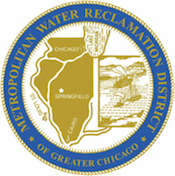Metropolitan Water Reclamation District of Greater Chicago
Senior Aquatic Biologist (#20003606)
General Statement
Under general supervision, supervises varied and specialized biological analyses, environmental monitoring activities and research related to the possible causes and/or effects of water pollution.
Essential Job Functions
Essential job functions are fundamental, core functions common to positions in a classification. They are not intended to be an exhaustive list of all job duties for any one position in the class. Since class specifications are designed to be descriptive and not restrictive, incumbents may complete one or all of the job duties listed or tasks of similar kind not specifically listed here.
- Assigns, supervises, and reviews work of subordinates. Recommends hiring, transfer, suspension, layoff, recall, promotion, and discharge.
- Designs, supervises, and administers comprehensive applied water and sediment quality monitoring activities. Specialties include the study of fish and benthic invertebrates, and chlorophyll.
- Conducts analyses of water and sediment samples and assesses the effects of water and sediment quality on aquatic organisms.
- Writes applied technical biological and chemical monitoring reports and scientific papers.
- Evaluates and analyzes technical water and sediment quality and biological monitoring data using statistics and biological/chemical metrics.
- Reviews and prepares comments on State and Federal water quality rules and regulations.
- Reviews scientific literature, technical reports, and information regarding biological assessments and water and sediment quality.
- Upon request of outside agencies, serves on technical committees and work groups in order to design and implement multidisciplinary water quality monitoring studies.
Other Job Functions
- Supervises date entry, verification, summarizing, and statistical analyses of biological and chemical monitoring data.
- Supervises and participates in the field collection of biological and water and sediment samples in rivers, streams, and lakes.
- Investigates water and sediment chemistry, and other physical conditions in order to determine their relationship to aquatic organisms.
- Conducts chemical water quality monitoring using in situ water quality equipment.
- Performs other duties as assigned.
Environmental Conditions
May involve exposure to a variety of chemical and biological materials, some of which may be hazardous or toxic. May involve exposure to fumes and noxious odors. Involves field work on a boat.
Desirable Knowledge, Skills and Abilities
- Extensive knowledge of the principles, practices, and procedures of aquatic ecology.
- Extensive knowledge of approved methods for the collection of aquatic organisms, water, and sediment samples, including the use of small boats and related equipment.
- Considerable knowledge of biostatistics.
- Considerable knowledge of USEPA water quality criteria and IEPA water quality standards.
- Extensive skill in the use of personal computers, including knowledge of spreadsheets and data base software programs.
- Ability to communicate effectively, both orally and in writing technical reports.
- Ability to communicate clearly and concisely, orally and in writing.
Minimum Qualification Requirements
Graduation from a four year accredited college or university majoring in biology or one of the biological sciences, and four years of experience in aquatic biology or a closely related field.
Substitution
Graduate study in biological sciences may be substituted for the required experience on a year-for-year basis.
Promotional Requirement
- One year of service with the District as an Aquatic Biologist or Associate Aquatic Biologist.
- Civil service status in one of the foregoing classifications.
CLASS: 20003606; EST: 1/1/2010; REV: 5/1/2017;
